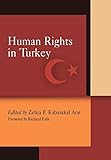Human Rights in Turkey / ed. by Zehra F. Kabasakal Arat.
Material type: TextSeries: Pennsylvania Studies in Human RightsPublisher: Philadelphia : University of Pennsylvania Press, [2013]Copyright date: ©2007Description: 1 online resource (376 p.)Content type:
TextSeries: Pennsylvania Studies in Human RightsPublisher: Philadelphia : University of Pennsylvania Press, [2013]Copyright date: ©2007Description: 1 online resource (376 p.)Content type: - 9780812240009
- 9780812201147
- 323.09561 22
- JC599.T87 H83 2007eb
- online - DeGruyter
- Issued also in print.
| Item type | Current library | Call number | URL | Status | Notes | Barcode | |
|---|---|---|---|---|---|---|---|
 eBook
eBook
|
Biblioteca "Angelicum" Pont. Univ. S.Tommaso d'Aquino Nuvola online | online - DeGruyter (Browse shelf(Opens below)) | Online access | Not for loan (Accesso limitato) | Accesso per gli utenti autorizzati / Access for authorized users | (dgr)9780812201147 |
Frontmatter -- Contents -- Foreword -- Chapter 1. Collisions and Crossroads: Introducing Human Rights in Turkey -- Part I. Freedoms and Antidiscrimination -- Chapter 2. Freedom of Press and Broadcasting -- Chapter 3. The Minority Concept and Rights in Turkey: The Lausanne Peace Treaty and Current Issues -- Chapter 4. The Human Rights Condition of the Rum Orthodox -- Chapter 5. Linguistic Human Rights and the Rights of Kurds -- Chapter 6. Freedom of Religion: Secularist Policies and Islamic Challenges -- Part II. Social and Economic Rights -- Chapter 7. So Near, Yet So Far: Freedom of Association and Workers' Rights -- Chapter 8. The Right to Education -- Chapter 9. Environmental Protection and Rights -- Part III. The Rights of the Displaced -- Chapter 10. Conflict-Induced Internal Displacement -- Chapter 11. Turkish Asylum Policy and Human Rights -- Part IV. Women's Rights -- Chapter 12. Women's Rights, Women's Organizations, and the State -- Chapter 13. The Effect of CEDAW on Women's Rights -- Part V. Civic and Educational Efforts -- Chapter 14. Human Rights Discourse and Domestic Human Rights NGOs -- Chapter 15. Tensions and Dilemmas in Human Rights Education -- Part VI. International Affairs and Interactions -- Chapter 16. Turkey's Participation in Global and Regional Human Rights Regimes -- Chapter 17. Leveraging Norms: The ECHR and Turkey's Human Rights Reforms -- Chapter 18. Conclusion: Turkey's Prospects and Broader Implications -- Notes -- References -- Contributors -- Index
restricted access online access with authorization star
http://purl.org/coar/access_right/c_16ec
Turkey's mixed human rights record has been highly politicized in the debate surrounding the country's probable ascendance to membership in the European Union. Beginning with the foundation of a secular republic in 1923, and continuing with founding membership in the United Nations and participation in the European Convention on Human Rights and Fundamental Freedoms, Turkey made significant commitments to the advancement of human rights. However, its authoritarian tradition, periods of military rule, increasing social inequality, and economic crises have led to policies that undermine human rights. While legislative reforms and civil social activism since the 1980s have contributed greatly to the advancement of human rights, recent progress is threatened by the rise of nationalism, persistent gender inequality, and economic hardship.In Human Rights in Turkey, twenty-one Turkish and international scholars from various disciplines examine human rights policies and conditions since the 1920s, at the intersection of domestic and international politics, as they relate to all spheres of life in Turkey. A wide range of rights, such as freedom of the press and religion, minority, women's, and workers' rights, and the right to education, are examined in the context of the history and current conditions of the Republic of Turkey.In light of the events of September 11, 2001, and subsequent developments in the Middle East, recent proposals about modeling other Muslim countries after Turkey add urgency to an in-depth study of Turkish politics and the causal links with human rights. The scholarship presented in Human Rights in Turkey holds significant implications for the study of human rights in the Middle East and around the globe.
Issued also in print.
Mode of access: Internet via World Wide Web.
In English.
Description based on online resource; title from PDF title page (publisher's Web site, viewed 24. Apr 2022)


